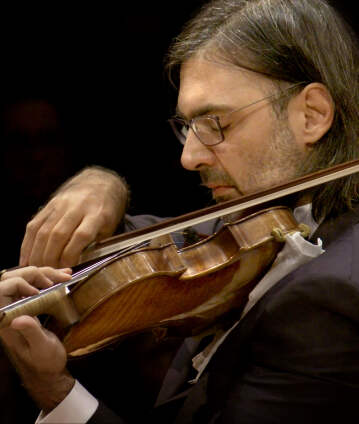Adam Fischer and Leonidas Kavakos

Dark tones in every shade dominate the beginning of this concert. For example, Alban Berg’s Violin Concerto, written in memory of the 19-year-old Manon Gropius, is one of the most poignant works of Modernism. Anton Webern’s delicate Passacaglia was written with the death of the composer’s own mother still fresh in his mind. In contrast to these is Antonín Dvořák’s Ninth Symphony From the New World with its folkloric cheerfulness and ingenious combination of American and Bohemian idioms.
When the American violinist Louis Krasner asked Alban Berg to write a violin concerto for him in February 1935, the composer told the musician he should be prepared for a long wait. But then everything changed: the death of the 18-year-old Manon Gropius, the daughter of Alma Mahler from her marriage to Walter Gropius, both shook Berg deeply and unleashed his creative powers, with the result that he composed the work within a few weeks. With this concerto, entitled “To the memory of an angel”, he created not only a musical monument to the young girl with whose family he was acquainted, but also wrote his own requiem. Shortly after its completion, Berg died. The piece, based on a twelve-tone row, affectionately, intimately and expressively describes Manon’s youthful innocence, her joie de vivre and her tragic death that finds its catharsis and exaltation in the quotation from the Bach chorale “Es ist genug!” (It is enough). “Berg invites us all to surrender ourselves to something that is bigger than us,” says Leonidas Kavakos, the soloist of the programme who, since his Philharmoniker debut in 2003, has performed not only the violin concertos of Ludwig van Beethoven and Johannes Brahms, but also the major concertos of the 20th century with the orchestra.
Anton Webern’s Passacaglia from 1908, which opens the programme, was also written in the wake of death, namely of his own mother. In this work, based on Baroque formal models, Webern – a student of Arnold Schoenberg like Berg – successfully combines lyrical and dramatic moods with strict counterpoint. The second part of the concert features Antonín Dvořák’s Ninth Symphony, a work the Czech composer wrote in 1892 during his stay in the United States. “The Americans expect great things of me,” wrote Dvořák. “First and foremost, I am to show them the way to the Promised Land and to the realm of new, independent art, in short, a national style of music!” In fact, the composer, in his Ninth, known as From the New World, created a unique soundscape thanks to the happy blend of American and Bohemian idioms. The piece is one of Dvořák’s most popular works. The concert is conducted by the Hungarian Adam Fischer who makes his debut with the Berliner Philharmoniker standing in for an indisposed Bernard Haitink.
© 2018 Berlin Phil Media GmbH
Related interviews
Artists
Our recommendations
- Simon Rattle conducts Beethoven’s “Pastoral” Symphony and Modernist concertos
- 2005 Europakonzert from Budapest with Simon Rattle and Leonidas Kavakos
- Gustavo Dudamel conducts “Also sprach Zarathustra”
- A Sibelius evening with Simon Rattle and Leonidas Kavakos
- Beethoven’s Violin Concerto with Leonidas Kavakos and Zubin Mehta
- Simon Rattle conducts the 2015 Europakonzert in Athens